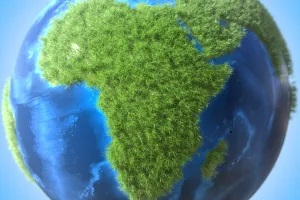
Despite being responsible for only 4% of global greenhouse gas emissions, Africa could potentially face a significant economic loss of up to $50 billion by 2040 due to the impacts of climate change. The continent is particularly vulnerable to climate change, experiencing recurrent floods and high temperatures that displace millions of people every year. To address these challenges, economists advocate for the adoption of green finance as a solution. However, Africa faces the hurdle of mobilizing green funds, despite the presence of established mechanisms. The continent has only managed to tap into 2% of its potential in the carbon credit market and a mere 1% in green bonds, as highlighted by the Economic Commission for Africa.
In this context, financial institutions, particularly banks, can play a crucial role in facilitating the mobilization of green funds. Economist Georges Vivien Hougbonon suggests that as Africa undergoes industrialization, it should integrate renewable energy into its industrial processes. Banks and investment funds are increasingly prioritizing green investments, considering it a significant criterion in their decision-making processes.
In other news, Morocco is cautiously optimistic about a 3.3% growth rebound in 2023, provided that the agricultural sector is spared from the historical drought experienced in recent years. The country recently celebrated the fifteenth anniversary of its agricultural show held in Meknes, which showcases the sector's achievements and innovations.
Meanwhile, the Reserve Bank of Zimbabwe is implementing various measures to address inflation and liquidity challenges. These measures include selling gold to the public and introducing coins that can serve as collateral for loans and credit facilities. Additionally, the central bank has launched a gold-backed cryptocurrency, despite reservations expressed by the International Monetary Fund.
Copyright © ENTREPRENEURSHIP DEVELOPMENT INSTITUTE 2015. All rights reserved.
Powered by: C.B.N